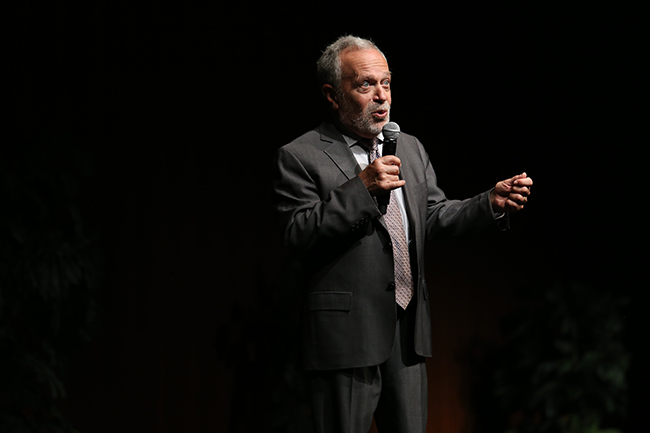Political economist and former White House adviser Robert Reich spoke Tuesday about the future of inequality as part of the Plan II Liz Carpenter lecture series.
“When we talk about the economy, normally what we talk about — at least in the business pages — is the stock markets, the business cycle or what the Federal Reserve board is about to do,” Reich said. “Those are very limited ways of looking at the economy.”
Reich said the economy has grown significantly since the late 1970s, but the median wage of workers has increased at a slower rate.
“Invariably, the political power starts going to the top as well,” Reich said.
Reich divided the problem of inequality into three vectors: globalization, technological displacement and demographics.
“Technological displacement has been going on for a very long time, but it’s getting faster, and our educational attainments are not keeping up with the rates of technological displacements,” Reich said. “And now that the baby boomers are all retiring, we have about three-and-a-half workers for every retiree. In a few years, it will be two.”
Samantha Meyer, a retired employee of IBM who was born during the baby boom, said she believes that Reich made good points about the baby boomer generation.
“He really knows what our futures hold, especially in terms of Medicaid and Medicare,” Meyer said. “[And] what we’re going to do when that problem arises.”
Reich said that young people should become more active in national, state and local governments.
“Politics is one of the noblest forms of public service,” Reich said. “Positive social change cannot be divorced from politics. You have got to be politically active. Now, especially.”
Computer science senior Valerie Roth said that she enjoyed the talk but did not feel a greater commitment to politics.
“The majority of politicians don’t look like me, and they don’t represent me,” Roth said. “So what’s my incentive? The majority of them are all straight, white males. I think addressing diversity should be an issue worth talking about, too.”
Reich concluded that America has a history of change and progressivism.
“We know from American history that when people are deeply disenchanted, when they lose faith, they can go in one of two directions,” Reich said. “They can move toward authoritarianism — like in other countries — or they can move toward reform. I hope that we choose the path we have chosen several times before, and that is fundamental reform.”





















